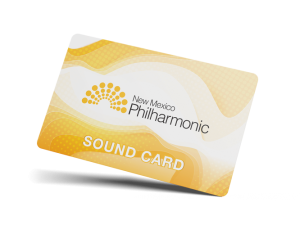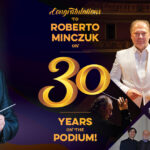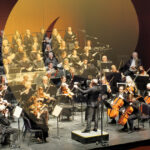Concert Review: Pianist Anna Dmytrenko and the NMPhil’s Mozart Evening
January 27, 2018 / For the NMPhil: Mozart’s Requiem Fundraising Special
Pianist Anna Dmytrenko and the NMPhil’s Mozart Evening
by David Rohde Pianist/Conductor/Theater Music Director/Vocal Instructor/Arts Writer Washington, D.C.
In today’s American concert culture, the piano concertos of Wolfgang Amadeus Mozart tend to occupy a separate little niche that fails to capture the excitement surrounding their original performances. Almost all of the Mozart concertos that are most often performed today come from Mozart’s heyday in the mid-1780s when he was flush with cash and fame, and Vienna high society clamored to get into his subscription concerts where they expected a brand new concerto every time. Thankfully a great deal of that atmosphere came back to life last Saturday night as the New Mexico Philharmonic presented Mozart’s Piano Concerto No. 21 in C Major, K. 467, as the entire first half of a program bookending a performance of the Mozart Requiem before a near sellout crowd at Popejoy Hall. The evening featured the return to Albuquerque of pianist Anna Dmytrenko, who won the Audience Prize, among other accolades, at the inaugural Olga Kern International Piano Competition sponsored by the New Mexico Philharmonic in November 2016. Anna threaded the special challenge of contemporary Mozart performance in large concert halls of maintaining the music’s classical rather than Romantic-era “shape” while still pouring on the depth and even occasional power to reach listeners’ hearts and emotions. I’m not sure I’ve ever seen a reaction to a Mozart concerto quite like she received from the Popejoy audience, one that went way beyond the rote standing ovation delivered by American audiences to most soloists. The first movement of the C Major concerto, after a standard introduction of the main themes by the orchestra, features a clever sneak-in by the pianist who almost pretends to “accompany” the orchestra with a set of trills and filigrees before finally agreeing to stake out the principal motives on the keyboard. This kind of ramp-up to the main event proved to be a wonderful vehicle for Anna’s artistry, which includes rapidly sparkling ornamental figures, snappy block chords, and very distinctive, sit-up-and-take-notice left hand runs. Especially because at this point in his career Mozart had become really inventive at the keyboard in developing his themes in multiple ways, the overall effect when the orchestra finally returned in full and took back the main themes was that it had a new lease on life with enhanced cohesion. A further highlight of the first movement was Anna’s selection of a fairly extended cadenza by 20th century French pianist-composer Robert Casadesus. In this one case the music wouldn’t have been anything like what Mozart’s own audience would have heard. But in Anna’s hands the cadenza’s intriguing modulations to unexpected keys and threatened breakout to a more Romantic conception of keyboard virtuosity was simply a treat for the contemporary audience, very appropriate for the featured position of this concerto on Saturday evening’s program. The gorgeous second movement in F major features a long-breathing melody with wide intervals that gradually lengthen out to a big, multi-octave, hand-crossing jump. The challenge for the pianist at the very moderate speed of this movement is not the virtuosity but the sonority – the notes of the melody that dive below the accompaniment must sound connected up with the rest of the tune rather than act as a sudden “bass.” At least from the balcony level of Popejoy Hall where I was sitting, Anna dug out a beautiful, cello-like tone from the keyboard to unify this line. From there she and the orchestra moved on to the movement’s achingly evocative oscillations from major to minor to major. The final movement, back in C major, was pure fun – basically a scamper for both the piano and orchestra in as light-hearted a mood as you can imagine. A surprise was Anna’s selection of a solo piano encore to reward the audience – the rarely heard (in America, at least) Canzona Matinata or “Morning Song” from a suite of “Forgotten Melodies” by Nikolai Medtner, a Russian contemporary of Sergei Rachmaninoff. Medtner’s music tends to start in a straightforward manner but find new tangents and thickets along the way, unifying the idea of a simple-sounding “form” like a tale or melody with the Russian late-Romantic tradition of emotionally laden virtuosity. This music begs for multiple hearings, and I suspect we’ll be hearing much more from Anna in her career about not only Medtner but also other lesserknown composers who made the piano their prime mode of expression and revelation. The New Mexico Philharmonic also deserves kudos for not succumbing to a common but tired tactic of labeling and marketing Mozart’s Piano Concerto No. 21 as “the Elvira Madigan concerto.” The reference is to a 1967 Ingmar Bergman film which used the second movement theme as a touchstone – something that the Philharmonic merely noted in passing in its program notes rather than titling the piece that way. The problem is that the name “Elvira” in contemporary American culture means something entirely different – a comedic and campy horror character. I cringe when symphony orchestras that are out of touch with younger audiences appear not to realize that. But perhaps the New Mexico Philharmonic is more on the ball because it also had the guts to present a Led Zeppelin-themed rock-and-symphonic concert in its pops program this season, and it certainly appeared from the turnout for Mozart on Saturday night that the orchestra is converting some of its pops audience to regular classical concerts. That is the gold standard for American symphony orchestras these days, and truly a thrill to be on hand to witness.
Download Article:
Pianist Anna Dmytrenko and the NMPhil’s Mozart Evening (pdf)




